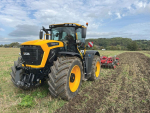Erratic weather and seismic events, more frequent these days, are prompting many farmers to have standby generators on site.
This is particularly so on dairy units so that milking can continue and harvested milk can still be refrigerated.
While PTO driven generators have been the go-to solution in the past the complexity of modern milking plants means that tractor driven units have difficulty maintaining a constant output.
“This can lead to incorrect voltages or frequencies that in turn can damage sensitive plant or equipment,” says Mitchell Day of Pace Power and Air, New Plymouth.
The company imports and distributes JCB portable diesel generators that produce from 8kVA to 730kVA. Most farms would be covered by units from 42 to 75kVA output.
Dependent on output, the JCB range uses engines from a wide range of suppliers including Yanmar, Iveco, Scania, MTU and, of course, JCB’s own DieselMax series. Parts and product support are easily available NZ-wide.
The JCB units are self-contained and self-regulating to run at 1500rpm while delivering a constant output of 400V and 50Hz outputs. Offered in open-frame or enclosed cabinet configurations, all models have a robust base frame to enhance on-site stability.
The enclosed cabinet units have all panels protected by a powder coat finish and large doors for easy access for daily checks and control panel use.
To ease moving, the units have integral fork pockets or lifting eyes in the upper frame, and have a bunded base to contain all generator fluids to avoid site contamination.
Enclosed units have heavy-duty mineral fibre insulation for noise reduction, and open frame units use an industrial-spec silencer.
A range of options include extra silencing, spark arrestors, remote monitoring and extra extended-use fuel tanks.
All units are fitted with a JCB CPI digital control panel, typically with a viewing window to remove the need to open access doors.
www.power-air.co.nz



















